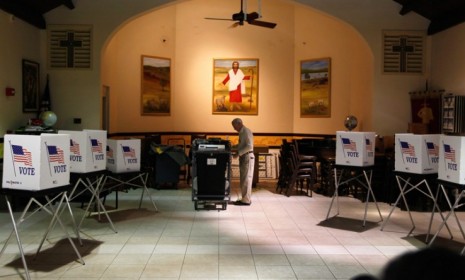Why the Florida primary is so important: 4 reasons
The Sunshine State's GOP primary turned into a brutal grudge match. A look at why Republicans fought so hard for Florida voters

A free daily email with the biggest news stories of the day – and the best features from TheWeek.com
You are now subscribed
Your newsletter sign-up was successful
As Florida Republicans go to the polls Tuesday, Republican presidential contenders Mitt Romney, Newt Gingrich, Ron Paul, and Rick Santorum finally go to bat in "the primary big leagues," says Adam Sorensen in TIME. More Republicans will have their ballots counted on Tuesday than in the past three contests combined. And "of course, Florida is an important general election state, too," says Aliyah Shahid in the New York Daily News, crucial to the electoral hopes of both President Obama and his eventual GOP challenger. That's why Republicans are holding their national convention in Tampa this summer. Here, four other big reasons that Florida's primary is crucial to the Republican presidential fight:
1. Only Republicans are voting
Florida is a big state with 4.1 million registered Republicans — 17 times more than New Hampshire. But here's the big reason the Sunshine State matters: "A closed primary," says Grayson Kamm at Tampa Bay's 10 News. Unlike Iowa, New Hampshire, and South Carolina, only Republicans can vote in Florida's GOP primary, and voters had to register by Jan. 3. "Winning a true, pure Republican election" — without any independent or Democratic voters in the mix — "is something the candidates for the GOP presidential nomination desperately want."
The Week
Escape your echo chamber. Get the facts behind the news, plus analysis from multiple perspectives.

Sign up for The Week's Free Newsletters
From our morning news briefing to a weekly Good News Newsletter, get the best of The Week delivered directly to your inbox.
From our morning news briefing to a weekly Good News Newsletter, get the best of The Week delivered directly to your inbox.
2. Demographically, Florida is "5 states in 1"
Campaigning in Florida is "more comparable to running a general election than in any other early state," making it an ideal testing ground, say Maggie Haberman and Emily Schultheis at Politico. It has 10 different media markets, and very distinct regions: The Panhandle resembles the deep South, heavily black Jacksonville anchors north Florida, south Florida is teeming with Cubans and New York transplants, the Gulf side is Midwestern retirees with overpriced houses, and the central I-4 corridor is a key swing area, temperamentally "like St. Louis with palm trees," says Quinnipiac University pollster Peter Brown. Florida's "a pretty good indicator of the country... It's like five different states."
3. The winner will (probably) take a lot of delegates
Florida was stripped of half its 99 delegates for violating party rules by holding its primary so early. But it still has 50 delegates to hand out, and in "another potential RNC no-no," it's giving all its delegates to the winner, says TIME's Sorensen. This winner-take-all policy in an expensive advertising state has "kept Paul out of the race, rendered Santorum a non-factor, and set up an all-or-nothing scenario for Romney or Gingrich: Whoever ends up finishing second will leave Florida with nothing to show for their huge investment." Well, not necessarily, says Adam C. Smith in the Tampa Bay Times. Expect a challenge to Florida's flouting of the RNC's proportional vote allocation rule, especially if the race ends up being close enough for a "drawn-out fight for every last delegate."
A free daily email with the biggest news stories of the day – and the best features from TheWeek.com
4. Florida is this year's "kingmaker"
The delegate count is important, "but momentum is what matters," says Chris Stirewalt at Fox News. "Florida is the last chance for Romney and Gingrich to clash in a high-profile, conclusive contest for the next four weeks," when the GOP holds four "lightly attended, non-binding caucuses." All four candidates are vowing to carry the fight to Super Tuesday on March 6, but that's "a lot harder to do if you limp out of" the Sunshine State. Florida is typically part of the Super Tuesday mega-voting, says A.J. Strata in Strata-Sphere. By going early, it's "actually in the kingmaker position this cycle."